【英语】副词的归纳
初中英语语法知识精讲:常用副词考法归纳6

初中英语语法知识精讲:常用副词考法归纳6英语副词的分类(1) 时间副词:常见的有now, then, soon, ago, recently, lately, later, before, early, today, tomorrow, yesterday, tonight, suddenly, immediately, still, already, just等。
如:An idea suddenly struck me.我心中忽然产生一个念头。
(2) 地点副词:常见的有here, there, up, down, away, nearby, home, ahead, abroad, indoors, overseas, upstairs, downstairs 等。
如:I am considering going abroad.我正在考虑出国。
(3) 方式副词:表示行为方式的副词大多以-ly结尾,常见的有quietly, heavily, warmly, carefully, happily, politely, angrily等。
如:Look at the picture carefully.仔细看这幅画。
(4) 频度副词:常见的有always, usually, often, frequently, constantly, occasionally, sometimes, seldom, hardly, rarely, never等。
Sometimes he gets up early.他有时起得早。
(5) 程度副词:常见的有fairly, pretty, rather, quite, very, much, too, greatly, almost, nearly, half, highly, deeply, partly, perfectly, really等。
如:The film was quite good.这个电影不错。
高中英语知识点归纳副词用法

高中英语知识点归纳副词用法副词是用来修饰动词、形容词、副词以及整个句子的词语。
在高中英语学习中,副词的用法非常重要。
本文将对高中英语中副词的用法进行归纳总结。
一、副词修饰动词1. 描述方式:- 如:She runs fast.(她跑得快)- 如:He speaks loudly.(他大声说话)2. 描述频率:- 如:They often go hiking.(他们经常去徒步旅行)- 如:I sometimes watch movies. (我有时看电影)3. 描述时间:- 如:She arrived early.(她早到了)- 如:They left late.(他们离开得晚)4. 描述地点:- 如:He lives nearby.(他住在附近)- 如:She went upstairs.(她上楼去了)二、副词修饰形容词和副词1. 描述程度:- 如:The movie is very interesting.(这部电影非常有趣)- 如:He is quite tall.(他相当高)2. 描述方式:- 如:She speaks English fluently.(她流利地说英语)- 如:He solved the math problem correctly.(他正确解答了这个数学题)三、副词修饰整个句子1. 描述时间:- 如:Tomorrow, I will go shopping.(明天,我要去购物)- 如:Unfortunately, it rained all day.(不幸的是,一整天都在下雨)2. 描述地点:- 如:Here, you can find many restaurants.(在这里,你可以找到很多餐馆)- 如:There, I met my old friend.(在那儿,我遇见了我的老朋友)3. 描述原因:- 如:Therefore, we decided to cancel the trip.(因此,我们决定取消这次旅行)- 如:However, she didn't attend the meeting.(然而,她没有参加会议)四、副词的变化形式1. 副词的比较级和最高级:- 如:He works harder than his brother.(他比他兄弟工作更努力) - 如:This is the most beautiful flower in the garden.(这是花园里最美的花)2. 副词的否定形式:- 如:She doesn't often visit her grandparents.(她不常去看望她的祖父母)- 如:He didn't carefully read the instructions.(他没有仔细阅读说明)3. 副词的词性转换:- 如:I want to swim, but it's too cold.(我想游泳,但天气太冷了) - 如:The sound was loud enough to wake him up.(声音足够大,可以把他吵醒)总结:副词在句子中的用法多种多样,能够用来修饰动词、形容词、副词以及整个句子。
高中英语知识点归纳副词短语的用法
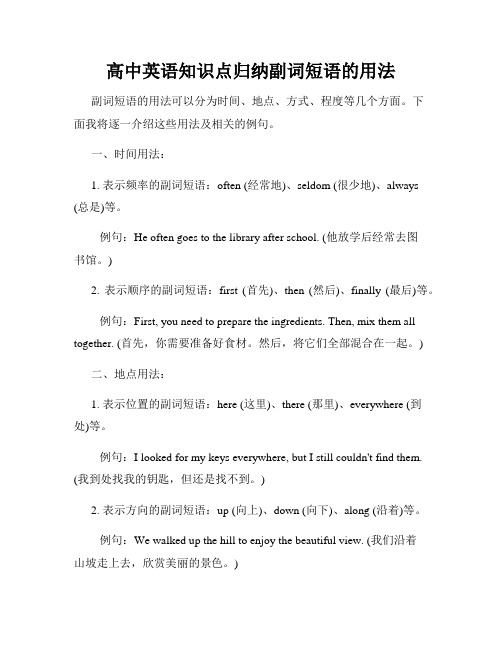
高中英语知识点归纳副词短语的用法副词短语的用法可以分为时间、地点、方式、程度等几个方面。
下面我将逐一介绍这些用法及相关的例句。
一、时间用法:1. 表示频率的副词短语:often (经常地)、seldom (很少地)、always (总是)等。
例句:He often goes to the library after school. (他放学后经常去图书馆。
)2. 表示顺序的副词短语:first (首先)、then (然后)、finally (最后)等。
例句:First, you need to prepare the ingredients. Then, mix them all together. (首先,你需要准备好食材。
然后,将它们全部混合在一起。
)二、地点用法:1. 表示位置的副词短语:here (这里)、there (那里)、everywhere (到处)等。
例句:I looked for my keys everywhere, but I still couldn't find them. (我到处找我的钥匙,但还是找不到。
)2. 表示方向的副词短语:up (向上)、down (向下)、along (沿着)等。
例句:We walked up the hill to enjoy the beautiful view. (我们沿着山坡走上去,欣赏美丽的景色。
)三、方式用法:1. 表示方式的副词短语:carefully (小心地)、quickly (快速地)、quietly (安静地)等。
例句:She spoke quietly so as not to wake the baby. (她小声说话,以免把孩子吵醒。
)2. 表示状态的副词短语:happily (快乐地)、sadly (悲伤地)、nervously (紧张地)等。
例句:The children jumped happily when they heard the good news. (孩子们在听到好消息时高兴地跳了起来。
第六章副词(思维导图+知识梳理+好题精炼)2022-2023初中英语中考语法归纳
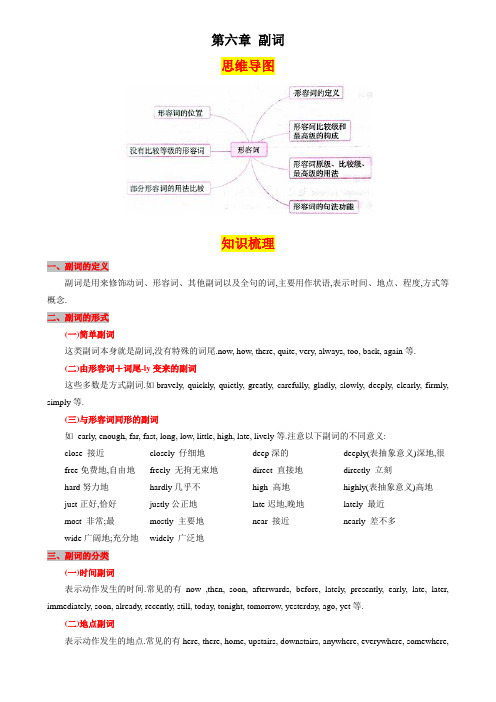
第六章副词思维导图知识梳理一、副词的定义副词是用来修饰动词、形容词、其他副词以及全句的词,主要用作状语,表示时间、地点、程度,方式等概念.二、副词的形式(一)简单副词这类副词本身就是副词,没有特殊的词尾.now, how, there, quite, very, always, too, back, again等.(二)由形容词+词尾-ly变来的副词这些多数是方式副词.如bravely, quickly, quietly, greatly, carefully, gladly, slowly, deeply, clearly, firmly, simply等.(三)与形容词同形的副词如early, enough, far, fast, long, low, little, high, late, lively等.注意以下副词的不同意义:close 接近closely 仔细地deep深的deeply(表抽象意义)深地,很free免费地,自由地freely 无拘无束地direct 直接地directly 立刻hard努力地hardly几乎不high 高地highly(表抽象意义)高地just正好,恰好justly公正地late迟地,晚地lately 最近most 非常;最mostly 主要地near 接近nearly 差不多wide广阔地;充分地widely 广泛地三、副词的分类(一)时间副词表示动作发生的时间.常见的有now ,then, soon, afterwards, before, lately, presently, early, late, later, immediately, soon, already, recently, still, today, tonight, tomorrow, yesterday, ago, yet等.(二)地点副词表示动作发生的地点.常见的有here, there, home, upstairs, downstairs, anywhere, everywhere, somewhere,nowhere, abroad, away, back, below, down, up, on, under, over, out, outside, backwards等.(三)方式副词表示动作发生的方式,这类副词数量最多,大多数以形容词加-ly构成.常见的有anxiously, awkwardly, angrily, absurdly, badly, bravely, calmly, carefully, carelessly, patiently, politely, proudly, properly, quickly, rapidly, suddenly, successfully, willingly, warmly等.(四)程度副词有时又叫强调副词,有的从程度上强调,用来回答how much这类问题,可用来修饰形容词、副词,有的还可用来修饰动词、介词短语、名词、代词和从句等.常见的有a bit, very, quite, rather, much, too, pretty, so, awfully, almost, entirely, nearly, never, partially, wholly, especially, even, exactly, just, only, simply等.这类副词一般位于它所修饰的词的前面.(五)频度副词描绘一定时间内动作发生的频率的副词.常见的有always, ever, frequently, never, often, rarely, seldom, sometimes, usually, unusually等.(六)疑问副词(一般用于特殊问句句首)主要用来构成特殊疑问句.常见的有how, when, where, why, what等.(七)句子副词这类副词往往和整个句子具有松散的语法关系,而并非修饰某个动词,actually, by all(no)means, decidedly, evidently, generally, frankly, indeed, in my opinion, unexpectedly, no , now, obviously, yes ,undoubtedly, luckily, seriously等.(八)连接副词用来连接句子、分句或从句,表示各种关系.1.表示结果therefore因此, accordingly从而2.表示添补besides此外, moreover再者3.表示对比however不管怎样, nevertheless然而4.表示条件otherwise否则5.表示时间then然后, lastly最后(九)解释副词常用来举例或列举,e.g.(=for example) 例如,for example 例如,i.e.(=that is)那就是.(十)关系副词常用来引导定语从句的有when, where, why等.各类副词举例如下:The bus arrived early.这趟车到得早.If you don't try, you will never succeed.你如果不尝试,就决不会成功.When and Where did you see him?你何时何地见到他的?I often write to her mother.我经常给她妈妈写信.How well he looks!他看起来多么健康啊!四、副词的句法功能副词在句中主要用作状语,修饰动词、形容词、副词或全句等;有时也用作表语、定语.(一)作状语This is a fairly useful tool.这是一件相当有用的工具.She usually wears belt-bag that round her middle when she goes out.她外出时,经常在腰间系上腰包.(二)作表语The train is off.火车开了.I must be off.我该走了.School is over.放学了.(三)作定语Life here is full of joy.这儿的生活充满了欢乐.Everyone there can speak English.那里的每个人都可以讲英语.(四)用作宾语补足语或主语补足语I saw him out with a girl.我看见他和一个女孩出去了.He was called in.他被叫了进来.五、副词的位置(一)频度副词频度副词的位置一般是置于be动词或助动词之后,若是其他动词则可置于之前.They sometimes stay up all night.他们有时整夜不睡觉.He can never understand.他永远也不会懂.有些频度副词,如:sometimes, yet, soon, once, often等也可放在动词后面(句尾);有些频度副词如:sometimes, usually, always, often, soon等需要强调时,也可放在句首.They'll be back soon.他们很快就回来.Usually I'm very careful.通常我是非常小心的.(二)程度副词一般放在所修饰的形容词、副词的前面,修饰动词时则取决于句中的位置.She is a very good student.她是个非常好的学生.The story is quite instructive.这故事很有教育意义.特别强调时,也可将程度副词放在句尾.例如:I've forgotten it completely.我把这事全给忘了.enough用作副词,一般放在所修饰的词后面.He didn't run quickly enough.他跑得不够快.The house isn't big enough for us.这房子对我们来说不够大.通常放在句尾,也可放在句首,一般不用于句中.We heard her singing an English song outside.我们听见她正在外面唱一首英文歌.Here you can find whatever kinds of books you want.在这里你可以找到各种你想要的书.(四)时间副词表示确定时间的时间副词一般放在句尾,有时放在句首.Tomorrow they are leaving for Beijing.明天他们要去北京.Yesterday she was late for class.昨天她上学迟到了.(五)方式副词方式副词在句中的位置比较灵活.She drives too fast.她开车开得太快.He hurriedly finished his supper and went out.他匆忙地吃完晚饭就出去了.点拨及物动词和副词如:down, off, in, out, up等组成的动词词组,其宾语如果是名词,该名词一般放在副词之后,但也可放在副词之前:若是代词,该代词要放在副词之前.Take off your coat.(或:Take your coat off./Take them of)脱掉你的外套.Turn off the radio.(或:Turn the radio off./Turn it off.)关上收音机.(六)疑问副词、连接副词通常放在句子(或从句)的开头.Where are they going?他们去哪儿?What are you going to do when you grow up?长大后,你打算干什么?How shall we do it?我们该怎么做呢?(七)副词的排列顺序若句子存在几个副词时,一般按方式副词-地点副词-时间副词的顺序排列.六、副词比较级和最高级的构成及其用法同形容词一样,副词也有三个比较等级:原级、比较级和最高级.(一)副词比较级、最高级的构成1.规则变化构成方法原级比较级最高级单音节词和少数双音节词一般在词尾加-er或-estfasthardnearfasterhardernearerfastesthardestnearest 以字母e结尾的副词加-r或-st late later latest 以辅音字母y结尾的副词,先变i,再加-er或-estearly earlier earliest多音节词和部分双音节词在副词前加more或mostquickly more quickly most quicklycarefully more carefully most carefully原级比较级最高级Well better bestBadly worse worstLittle less leastMuch more mostLate later较迟,后来(指时间) latest最近(指时间) latter后来(针对前者而言) last最后(指顺序) Far farther较远farthest最远further进一步furthest最远,最大程度上1.原级常用于as+副词原级+as和not so/as+副词原级+as结构as...as常用于肯定句,表示“······和······一样”;not so/as...as用于否定句,表示“不如”.We must arrange everything as well as we can.我们要把一切尽可能安排好.You didn't know so(as) much about that as I do.关于那件事,你了解得没有我这么多.2.比较级常用于“比较级+than”结构,有时than引导的比较状语从句可以省略,当than前后所使用的动词相同时,通常用助动词来代替原有的动词,而且该助动词也可以省略比较级前可用much, far, a bit, a little, a great(deal),a lot, completely, even, still, yet等表示程度的状语.She answered the question more clearly than her classmates did.她回答问题比她的同学回答得清楚.It rains more often in the south than in the north.南方比北方雨多.Li Ping jumped farther than Jim (did).李平跳得比吉姆远.3.副词的最高级表示三者或三者以上(人或物)的比较,其中有一个在某方面超过其他几个时,要用最高级副词的最高级前面可以加定冠词the,也可以不加.句中一般可带in和of引导短语来说明比较的范围.如: The longest I can stay is three hours.我最多只能呆三小时.Tom came to school(the)latest in his class.汤姆是班上到校最晚的.4.可用“the+比较级·····,the+比较级······”结构,表示“越······就越······”的意思The higher you climb, the farther you will see.你爬得越高,就看得越远.The harder she studied, the more progress she made.她学习越努力,进步越大.5.可用“比较级+and+比较级”结构(两个同义副词比较级,后面不接than从句)表示“越来越·····”的意思Jim runs faster and faster.吉姆跑得越来越快.The students study harder and harder.学生们学习越来越努力.七、常用副词的用法比较(一)already, yet, stillalready用于肯定句,表示“已经”.yet用于否定句作“还”解,用于疑问句作“已经”解.still主要用于肯定句,放在be动词或情态动词后实义动词前,表示动作或状态的持续,作“仍然”解.He had already left when I called.我打电话时,他已经走了.It's already ten o'clock. Who is still washing there?已经10点钟了,谁还在那儿洗衣服?Have you found your ruler yet?你找到你的尺子了吗?点拨(1)already在疑问句中有表示惊奇等感情的功能,但它通常被用来表示因事情进展迅速而吃惊,而still则表示因事情进展缓慢而吃惊.如:Have you done it already?你已经做完了?Are you still reading the book?你还在读那本书吗?(2)yet和still可用于比较级前,表示程度Tom sings well but Jim sings still better.汤姆唱得好,但吉姆唱得更好.The manager has yet more important things to do.经理还有更重要的事要做.(二)so, neither, nor三个词都能表示后者和前者情况相似.so用于肯定句,用句型:so+助动词(系动词或情态动词)+主语.neither和nor用于否定句,用句型:neither(nor)+助动词(系动词或情态动词)+主语.She likes dancing. So does he.她喜欢跳舞,他也一样.Jack didn't like the play. Nor did we.杰克不喜欢这出戏,我们也不喜欢.(三)too, also, either这三个词作副词用时都含有“也”的意思,但用法是不同的.1.too和also不能用于否定句,只能用于肯定句中.too用于句末,also用于句子中间I enjoy swimming and like football, too.我喜欢游泳,也喜欢踢足球.I'm tired, and hungry, too.我累了,(肚子)也饿了.2.either只能用于否定句中,放在句末.too或either前面可以用逗号,也可以不用Kate didn't go to the cinema and Lucy didn't go, either.凯特没去看电影,露西也没去看电影.It's not easy, but it's not difficult, either.它不容易,但也不难.(四)enough...to, too...to1.enough to do sth.足以能够做某事The window is low enough for him to touch.窗很低,他碰得到.You are old enough to do the work alone.你已经大了,可以独立做这项工作了.He is tall enough to reach the apple.他的个子高,能够着那个苹果.2.too...to(do)太······以致不能The milk is too hot to drink.牛奶太烫了,不能喝.She's too young to get married.她太小不能结婚.They spoke English too quickly for us to understand.他们讲英语太快,我们听不明白.(五)now, just, just now1.now与一般现在时、现在进行时、现在完成时连用时,意为“现在”Where does he live now?他现在住在哪里?They are now doing some washing.她们正在洗衣服.2.just常与现在完成时、过去完成时连用,表示“刚······”We have just seen the film.我们刚看过那部电影.He said he had just bought a dictionary.他说他刚买了一本字典.3.just now和过去时连用,表示“刚才”(=a moment ago)He was here just now.他刚才在这.4.和一般现在时或现在进行时连用时,just now与“just at the moment”同义,有加强now(此时)的语气的作用We are very busy just now.我们此时很忙.She is doing her homework just now.她此时正在做作业.(六)ago, beforeago表示以现在为起点的“以前”,它必须和一些表示时间概念的词组搭配使用,常在一般过去时态的句子中修饰动词.before是指以过去或将来的某时刻“以前”,也可泛指以前,常和现在完成时、过去完成时和一般过去时连用.I saw him ten minutes ago.10分钟前我见过他.He told me that he had seen the film (two days)before.他告诉我他(两天)以前看过这部电影.I never saw him before(=I have never seen him before.)我以前从来没见过他.(七)although, though一般情况下,although和though可互换使用,但在语言具体使用过程中,要特别注意以下几点:1.although有增强语气的作用,比though的语气稍重,常用于各种正式文体;而非正式的口语或书面语中,though用得较为普遍2.though常与even连用,表示强调.但不能说even although(八)nearly, almost都可译为“差不多,几乎”,常可通用.其区别:1.nearly可以用在not后,意思是“远远不(够)”,而almost不能I'm not nearly ready.我完全没有准备好.I have £ 20,but that isn't nearly enough for the travel.我有20英镑,但那远远不够旅行的费用.2.almost可以用在any, no, nobody, nothing, none, never前,而nearly不能Almost no one believes her.几乎没人相信她.I almost never saw him.我几乎没见过他.3.though引导的让步状语从句可用部分倒装的形式(注意:倒装后位于句首的名词之前不用冠词),但although一般不这样用.Young though she is, she has travelled to many countries.她尽管年轻,但已到过很多国家.Hard though they tried, they couldn't make her change her mind.尽管他们做了很大努力,却没法让她改变主意.(九)sometimes, sometime, some time1.sometimes的意思是“有时,往往,不时地”Sometimes we are busy and sometimes we are not.有时我们忙,有时我们不忙.I sometimes have letters from him.我不时地收到他的信.2.sometime的意思是“某个时候”,可指将来,也可指过去We'll take our holiday sometime in May.我们将在五月份的某个时候休假.Let's have dinner together sometime next week.下星期找个时间咱们一起吃顿饭.3.some time的意思是“一段时间”,可以是几分钟、几小时、几天甚至几年The fire went on for some time before it was brought under control.火灾持续了一段时间以后才得到了控制.He stayed in Beijing for some time and then began to move on.他在北京住了些日子又继续搬迁.(十)finally, at last, in the end都有“最后”“最终”之意,常可互换,但用法不完全一样.finally通常在讲最后一个内容时用.Finally I'd like to thank all of you for coming to the party.最后我想向所有出席这次聚会的人表示感谢.at last有强烈的感情色彩,表示经过曲折“终于”.He looked for it everywhere. At last he found it.他到处找,最后终于找到了它.在表示将来的“最终”“终于”时,只能用in the end.We believe that he will become a famous writer in the end.我们相信他最终将成为一名名作家.(十一)maybe, perhaps, possibly和probably都可译为“可能”“也许”.其区别:probably的可能性最大,可译为“十有八九”“很可能”.maybe和perhaps的可能性通常是50%.possibly可能性最小,可能性不超过30%.好题精练一、写出下列副词的比较级和最高级形式1.fast________ ________2.early________ ________3.well________ ________4.little________ ________te________ ________6.hard________ ________7.much________ ________ 8.correctly________ ________9.quickly________ ________ 10.carefully________ ________答案:1.faster,fastest2.earlier,earliest3.better,best4.less,leastter,latest6.harder,hardest7.more,most 8.more correctly, most correctly9.more quickly, most quickly 10.more carefully, most carefully二、根据句意,给下列句子填上适当的词1.He doesn't run________ fast as I do.2.My sister doesn't speak English as fluently(流利) ________ my brother.3.The baby cried harder and________.4.Does it rain________ often in summer in Shanghai than in Beijing?5.I'm________ hungrier now.答案:1.so/as2.as3.harder4.more5.a little/much三、选择括号中适当的词填空1.This boy is________ clever but________ lazy.(rather, quite)2.I like Tom and Mary. They are________ nice people.(such, so)3.There's________ anything in the bridge.(hardly, hard)4.The piano is________ heavy to move.(too, enough)5.Don't go now. It is________ raining hard.(yet, still)6.He is ________ ready to help people. We like him.(always, never)7.George is always________ .Now he is driving along the narrow road.(carefully, careful)8.Our holiday was too short. The time passed very________ (quickly, quick)答案:1.quite,rather2.such3.hardly4.too5.still6.always7.careful,carefully8.quickly四、选择填空1.Wu Dong learns English________.A. goodB. niceC. wellD. fine2.-How________ is it from your school to the post office?-Only a few kilometres.A. longB. oftenC. soonD. far3.My brother is good at drawing, I am good at it, ________.A. tooB. eitherC. neitherD. also4.- ________ did you go last weekend?-I went to the Great Wall.A. WhatB. WhereC. WhenD. Who5.Who runs________ in your class?A. fastB. fasterC. fastestD. more fast6.Which do you like________, bread, rice or noodles?A. betterB. bestC. wellD. much7.Have you ever seen________ big panda before?A. a suchB. such a C .so a D. a so8.He eats________ food, so he is________ fat.A. much too; too muchB. much too; too manyC. too much; much tooD. too much; many too9.Have you received a letter from Jim________?A. yetB. justC. neverD. ever10.I don't feel very________ today.A. goodB. wellC. betterD. nice答案:1-5CDABC 6-10BBCAB五、用括号内词的适当形式填空1.Tom studies________ (hard) than you.2.He sang________ (badly) than any other boy in the group. His elder sister sang________ (well) of all.3.She speaks English quite________ (well),but she doesn't speak as________ (well) as Mary.4.I cannot run as________ (fast) as you. You run________ (fast) than me.5.He writes________ (carefully) than she does. He doesn't write as________ (carefully) as she does.6.Black swims________ (well) than I do, but he doesn't swim as________ (well)as my brother.7.They all finished the work two hours________ (early) than usual.8.I walk________ (slowly) than my sister.答案:1.harder2.worse,best3.well,well4.fast,faster5.more carefully, carefully6.better,well7.earlier 8.more slowly。
七年级英语副词知识点归纳
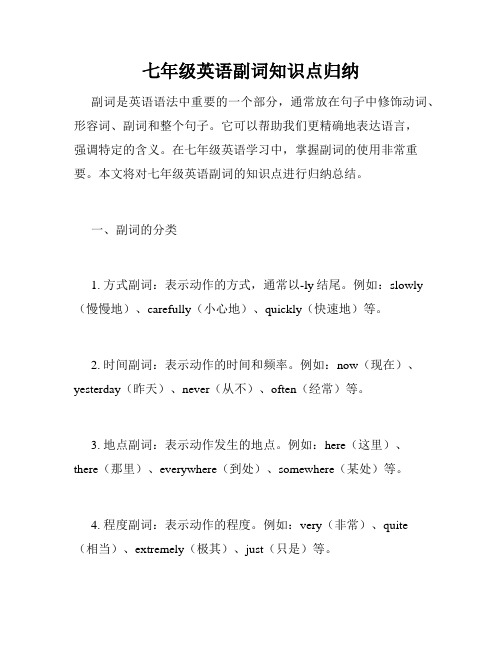
七年级英语副词知识点归纳副词是英语语法中重要的一个部分,通常放在句子中修饰动词、形容词、副词和整个句子。
它可以帮助我们更精确地表达语言,强调特定的含义。
在七年级英语学习中,掌握副词的使用非常重要。
本文将对七年级英语副词的知识点进行归纳总结。
一、副词的分类1. 方式副词:表示动作的方式,通常以-ly结尾。
例如:slowly (慢慢地)、carefully(小心地)、quickly(快速地)等。
2. 时间副词:表示动作的时间和频率。
例如:now(现在)、yesterday(昨天)、never(从不)、often(经常)等。
3. 地点副词:表示动作发生的地点。
例如:here(这里)、there(那里)、everywhere(到处)、somewhere(某处)等。
4. 程度副词:表示动作的程度。
例如:very(非常)、quite(相当)、extremely(极其)、just(只是)等。
二、副词的使用1. 位置:通常放在动词之后,如:She sings well.(她唱得好。
)但是如果修饰整个句子,则放在句首或结尾。
例如:Luckily, I found my keys.(幸运的是,我找到了我的钥匙。
)2. 修饰形容词:例如:He is extremely handsome.(他非常帅气。
)3. 修饰副词:例如:She speaks English very well.(她英语说得非常好。
)4. 修饰整个句子:例如:Fortunately, the weather is good.(幸运的是,天气很好。
)三、副词的比较级和最高级1. 比较级:用于表示两个事物之间的比较。
一般在形容词和副词后面加-er或-more。
例如:She sings more beautifully than her sister.(她唱歌比她妹妹更好听。
)2. 最高级:用于表示三个或三个以上事物之间的比较。
一般在形容词和副词前面加the most或the -est。
英语副词归纳

简介副词连用顺序:程度副词+方式副词+地点副词+时间副词。
副词fùcí[adverb] 起修饰或限制动词或形容词作用、表程度或范围的词。
分类1) 时间和频率副词:now,then,often,always,usually,early,today,late,next,lastday,already,generally,frequently, seldom,ever,never,yet, soon,too, immediately, finally,shortly, before, ago,sometimes, yesterday. once,twice2) 地点副词:here, there, everywhere, anywhere, in, out, inside, outside, above, below, down, back, forward, home, upstairs, downstairs, across, along, round , around, near, off, past, up, away, on.3) 方式副词:carefully, properly, anxiously, suddenly, normally, fast, well, calmly, politely, proudly, softly, warmly4) 程度副词:much,little, very,rather,so,too,still, quite, perfectly, enough, extremely, entirely,almost, slightly, hardly.5) 疑问副词:how, when, where, why.6) 关系副词:when, where, why. how等。
7) 连接副词:therefore,moreover,however,otherwise,then,when ,where,how,why 等。
初中英语副词总结归纳大全
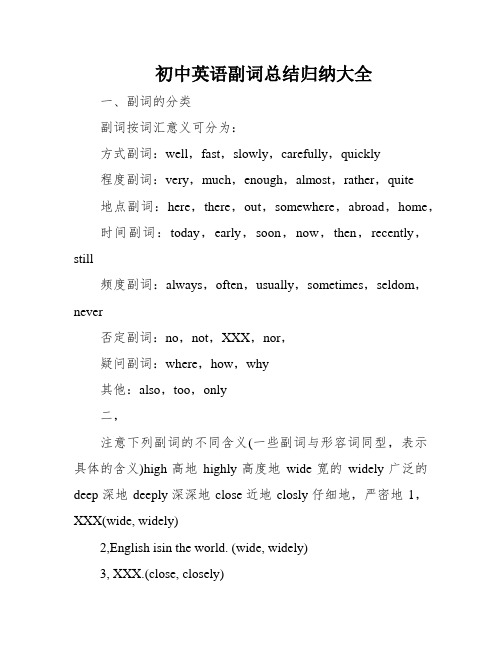
初中英语副词总结归纳大全一、副词的分类副词按词汇意义可分为:方式副词:well,fast,slowly,carefully,quickly程度副词:very,much,enough,almost,rather,quite地点副词:here,there,out,somewhere,abroad,home,时间副词:today,early,soon,now,then,recently,still频度副词:always,often,usually,sometimes,seldom,never否定副词:no,not,XXX,nor,疑问副词:where,how,why其他:also,too,only二,注意下列副词的不同含义(一些副词与形容词同型,表示具体的含义)high高地highly高度地wide宽的widely广泛的deep深地deeply深深地close近地closly仔细地,严密地1,XXX(wide, widely)2,English isin the world. (wide, widely)3, XXX.(close, closely)4, Watch him(close, closely)5, XXX was flying.(high, highly)6, XXX(high, highly)7, XXX.(deep, deeply)7, XXX(deep, deeply)两种形式的副词含义迥异。
XXX迟,晚XXX最近hard勉力的,艰苦地hardly几乎不just方才,仅仅,正好justly公道地,合理地most很,最mostly主要地almost几乎,差不多三,其它副词比较:1, already与yet的区分already用于一定句句中,透露表现“已经”;yet用于否认句句末,透露表现“还”,用于疑问句句末,透露表现“已经”比方,He had already left when I called.当我给他打德律风时,他已经离开了。
初中英语副词总结归纳大全
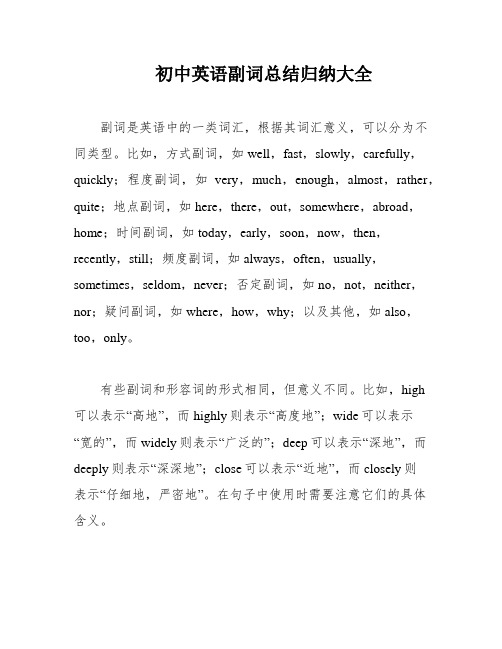
初中英语副词总结归纳大全副词是英语中的一类词汇,根据其词汇意义,可以分为不同类型。
比如,方式副词,如well,fast,slowly,carefully,quickly;程度副词,如very,much,enough,almost,rather,quite;地点副词,如here,there,out,somewhere,abroad,home;时间副词,如today,early,soon,now,then,recently,still;频度副词,如always,often,usually,sometimes,seldom,never;否定副词,如no,not,neither,nor;疑问副词,如where,how,why;以及其他,如also,too,only。
有些副词和形容词的形式相同,但意义不同。
比如,high可以表示“高地”,而highly则表示“高度地”;wide可以表示“宽的”,而widely则表示“广泛的”;deep可以表示“深地”,而deeply则表示“深深地”;close可以表示“近地”,而closely则表示“仔细地,严密地”。
在句子中使用时需要注意它们的具体含义。
还有一些副词虽然形式不同,但意义相近。
比如,XXX表示“迟,晚”,而XXX则表示“最近”;hard表示“努力的,艰苦地”,而hardly则表示“几乎不”;just可以表示“刚刚,仅仅,恰好”,而justly则表示“公正地,正当地”;most可以表示“很,最”,而mostly则表示“主要地”,而almost则表示“几乎,差不多”。
最后,需要注意一些副词的区别。
比如,already用于肯定句中,表示“已经”,而yet用于否定句末,表示“还”,用于疑问句末,表示“已经”。
例如,“He had already left when I called.”(当我给他打电话时,他已经离开了。
)Have you found your ruler yet。
初中英语常见的副词归纳
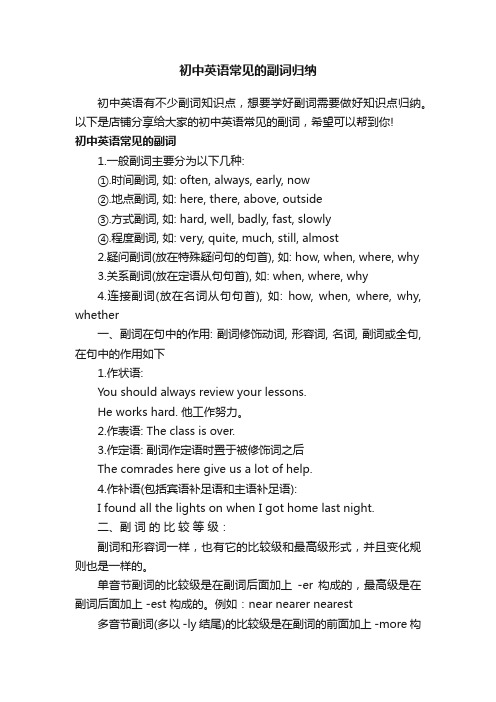
初中英语常见的副词归纳初中英语有不少副词知识点,想要学好副词需要做好知识点归纳。
以下是店铺分享给大家的初中英语常见的副词,希望可以帮到你!初中英语常见的副词1.一般副词主要分为以下几种:①.时间副词, 如: often, always, early, now②.地点副词, 如: here, there, above, outside③.方式副词, 如: hard, well, badly, fast, slowly④.程度副词, 如: very, quite, much, still, almost2.疑问副词(放在特殊疑问句的句首), 如: how, when, where, why3.关系副词(放在定语从句句首), 如: when, where, why4.连接副词(放在名词从句句首), 如: how, when, where, why, whether一、副词在句中的作用: 副词修饰动词, 形容词, 名词, 副词或全句, 在句中的作用如下1.作状语:You should always review your lessons.He works hard. 他工作努力。
2.作表语: The class is over.3.作定语: 副词作定语时置于被修饰词之后The comrades here give us a lot of help.4.作补语(包括宾语补足语和主语补足语):I found all the lights on when I got home last night.二、副词的比较等级:副词和形容词一样,也有它的比较级和最高级形式,并且变化规则也是一样的。
单音节副词的比较级是在副词后面加上-er 构成的,最高级是在副词后面加上 -est 构成的。
例如:near nearer nearest多音节副词(多以 -ly 结尾)的比较级是在副词的前面加上 -more 构成的。
最高级是在副词前面加上-most 构成的.例如;warmly more warmly most warmly有些副词的比较级和最高级形式是不规则的:well-better - best little - less - leastmuch- more - most badly - worse - worstfar-farther(further)-farthest(furthest)副词的比较级和最高级用法同形容词的比较级用法基本一样,两者比较用比较级,三者或以上用最高级,但是副词最高级形式句中the 可以省略。
英语副词的用法归纳总结

英语副词的用法归纳总结英语副词( Adverbs)是一类词汇,用来修饰动词、形容词、其他副词或整个句子,以表达时间、地点、程度、方式或频率等概念。
以下是英语副词的用法归纳总结:1.(修饰动词•程度副词( Adverbs(of(Degree):(表示程度或强度,如("very" 非常)、"extremely"( 极其)、"quite"( 相当)、"rather"( 有点)、"too" 太)、"enough" 足够)等。
•例句:She(speaks(very(softly.•方式副词 Adverbs(of(Manner):(描述动作或事件的方式,如("slowly" 慢慢地)、"carefully" 小心地)、"quickly" 快速地)、"happily" 快乐地)等。
•例句:He(ran(quickly(to(catch(the(bus.•频率副词 Adverbs(of(Frequency):(表示动作发生的频率,如("always"( 总是)、"often"( 经常)、"sometimes"( 有时候)、"never" 从不)、"rarely" 很少)等。
•例句:She(always(arrives(early(for(work.2.(修饰形容词或其他副词•程度副词 Adverbs(of(Degree):(可以用来修饰形容词或其他副词,以增强或减弱它们的含义。
•例句:The(weather(is(very(hot(today.(She(sings(extremely(well.3.(修饰句子•状语 Adverbial(Phrase):(由一个或多个副词构成的短语,用来修饰整个句子,表达时间、地点、条件、原因等。
形容词和副词的知识点归纳英语

形容词和副词的知识点归纳英语一、形容词。
1. 定义与作用。
- 形容词主要用来修饰名词,表示人或事物的性质、状态和特征等。
例如:a beautiful flower(美丽的花朵),“beautiful”描述了“flower”的特征。
2. 形容词的位置。
- 前置修饰:一般放在所修饰的名词之前。
如:a tall boy(一个高个男孩)。
- 后置修饰:- 当修饰不定代词时,形容词后置。
例如:something interesting(有趣的事情)。
- 在一些固定结构中,如“the +形容词”表示一类人时,形容词后置。
例如:the old(老人),the young(年轻人)。
3. 形容词的比较级和最高级。
- 比较级的构成。
- 一般在形容词词尾加 -er。
例如:tall - taller。
- 以e结尾的形容词,直接加 -r。
如:nice - nicer。
- 重读闭音节,双写尾字母再加 -er。
例如:big - bigger。
- 以“辅音字母 + y”结尾的形容词,把y变为i再加 -er。
如:heavy - heavier。
- 不规则变化:good/well - better,bad/badly - worse,many/much - more 等。
- 最高级的构成。
- 一般在形容词词尾加 -est。
例如:tall - tallest。
- 以e结尾的形容词,直接加 -st。
如:nice - nicest。
- 重读闭音节,双写尾字母再加 -est。
例如:big - biggest。
- 以“辅音字母 + y”结尾的形容词,把y变为i再加 -est。
如:heavy - heaviest。
- 不规则变化:good/well - best,bad/badly - worst,many/much - most 等。
- 比较级和最高级的用法。
- 比较级用于两者之间的比较,常用结构有:A+be+形容词比较级+than + B。
小学英语语法总复习知识点归纳:副词
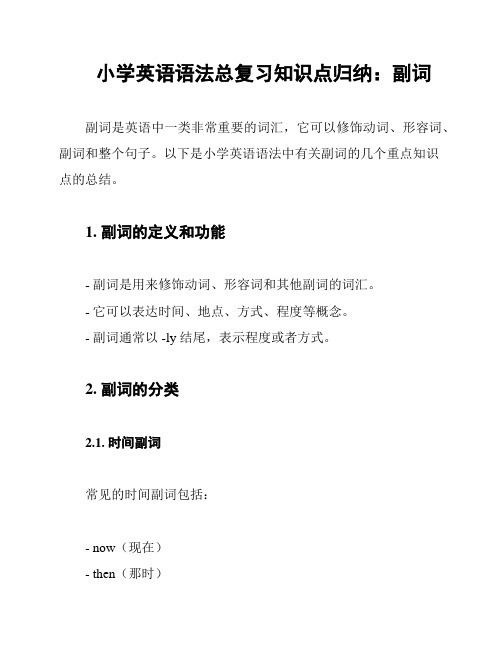
小学英语语法总复习知识点归纳:副词副词是英语中一类非常重要的词汇,它可以修饰动词、形容词、副词和整个句子。
以下是小学英语语法中有关副词的几个重点知识点的总结。
1. 副词的定义和功能- 副词是用来修饰动词、形容词和其他副词的词汇。
- 它可以表达时间、地点、方式、程度等概念。
- 副词通常以 -ly 结尾,表示程度或者方式。
2. 副词的分类2.1. 时间副词常见的时间副词包括:- now(现在)- then(那时)- always(总是)- often(经常)- sometimes(有时候)- never(从不)2.2. 地点副词常见的地点副词包括:- here(这里)- there(那里)- everywhere(到处)- nowhere(无处/任何地方都不)2.3. 方式副词常见的方式副词包括:- quickly(快速地)- slowly(慢慢地)- well(好地)- badly(糟糕地)- loudly(大声地)- quietly(安静地)2.4. 程度副词常见的程度副词包括:- very(很)- quite(相当)- pretty(相当)- extremely(极其)- slightly(稍微)3. 副词的用法- 副词通常用于修饰动词,表达动作的方式、频率或者程度。
- 副词可以放在动词前面或者后面。
如果是短副词(如 well, fast),通常放在动词前面,而长副词(如 beautifully, quickly)则通常放在动词后面。
- 副词也可以用于修饰形容词或其他副词。
如:She is extremely tall.(她非常高。
)4. 注意事项- 副词不可以修饰名词。
- 副词的位置可以根据需要进行灵活调整。
以上是小学英语语法中关于副词的主要知识点总结。
希望对你的学习有所帮助!。
英语副词归纳

英语副词归纳(总17页)--本页仅作为文档封面,使用时请直接删除即可----内页可以根据需求调整合适字体及大小--英语副词简介副词连用顺序:程度副词+方式副词+地点副词+时间副词。
副词fùcí[adverb] 起修饰或限制动词或形容词作用、表程度或范围的词。
分类1) 时间和频率副词:now,then,often,always,usually,early,today,late,next,lastday,already,generally,frequently, seldom,ever,never,yet, soon,too, immediately, finally,shortly, before, ago,sometimes, yesterday. once,twice2) 地点副词:here, there, everywhere, anywhere, in, out, inside, outside, above, below, down, back, forward, home, upstairs, downstairs, across, along, round , around, near, off, past, up, away, on.3) 方式副词:carefully, properly, anxiously, suddenly, normally, fast, well, calmly, politely, proudly, softly, warmly这儿很难弄到食物。
Let him out!(作补语)让他出去!.修饰名词的副词放在被修饰词之后a. The villagers there are busy getting in wheat 位置1) 实义动词之前,be动词、情态动词之后。
I am also Bush.I can also do that.I also want to play that games.I get up early in the morning every day.我每天早早起床。
英语 副词分类
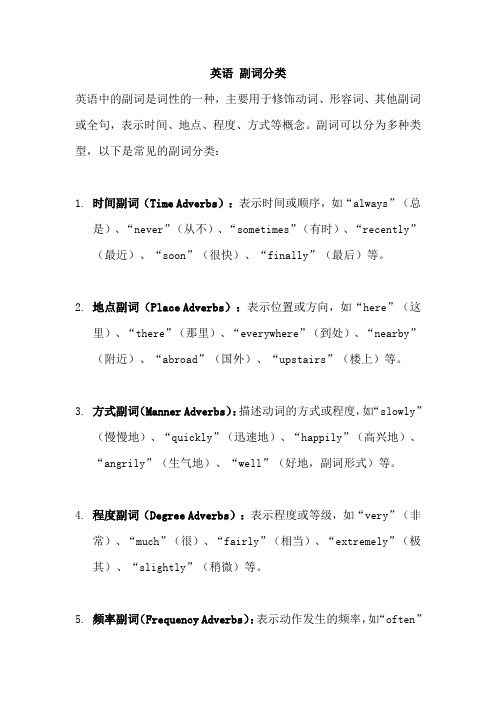
英语副词分类英语中的副词是词性的一种,主要用于修饰动词、形容词、其他副词或全句,表示时间、地点、程度、方式等概念。
副词可以分为多种类型,以下是常见的副词分类:1.时间副词(Time Adverbs):表示时间或顺序,如“always”(总是)、“never”(从不)、“sometimes”(有时)、“recently”(最近)、“soon”(很快)、“finally”(最后)等。
2.地点副词(Place Adverbs):表示位置或方向,如“here”(这里)、“there”(那里)、“everywhere”(到处)、“nearby”(附近)、“abroad”(国外)、“upstairs”(楼上)等。
3.方式副词(Manner Adverbs):描述动词的方式或程度,如“slowly”(慢慢地)、“quickly”(迅速地)、“happily”(高兴地)、“angrily”(生气地)、“well”(好地,副词形式)等。
4.程度副词(Degree Adverbs):表示程度或等级,如“very”(非常)、“much”(很)、“fairly”(相当)、“extremely”(极其)、“slightly”(稍微)等。
5.频率副词(Frequency Adverbs):表示动作发生的频率,如“often”(经常)、“seldom”(很少)、“always”(总是)、“frequently”(频繁地)等。
6.疑问副词(Interrogative Adverbs):用于引导疑问句,询问关于时间、地点、方式或原因的信息,如“when”(何时)、“where”(何地)、“why”(为何)、“how”(如何)等。
7.连接副词(Conjunctive Adverbs):用于连接句子或从句,表示逻辑或时间关系,如“therefore”(因此)、“however”(然而)、“besides”(此外)、“meanwhile”(同时)等。
副词的用法初中英语知识归纳
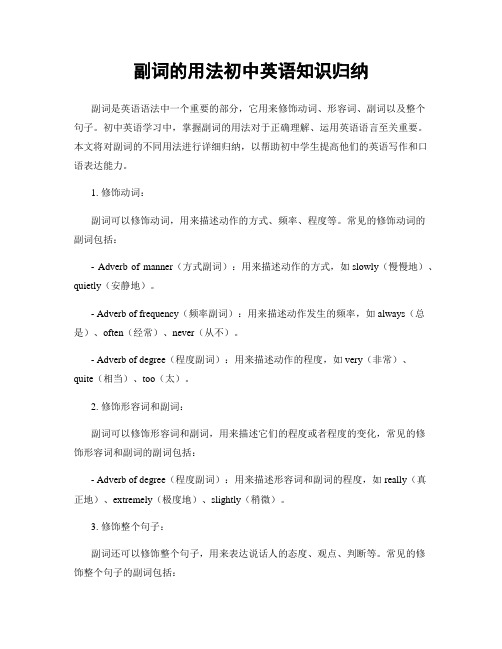
副词的用法初中英语知识归纳副词是英语语法中一个重要的部分,它用来修饰动词、形容词、副词以及整个句子。
初中英语学习中,掌握副词的用法对于正确理解、运用英语语言至关重要。
本文将对副词的不同用法进行详细归纳,以帮助初中学生提高他们的英语写作和口语表达能力。
1. 修饰动词:副词可以修饰动词,用来描述动作的方式、频率、程度等。
常见的修饰动词的副词包括:- Adverb of manner(方式副词):用来描述动作的方式,如slowly(慢慢地)、quietly(安静地)。
- Adverb of frequency(频率副词):用来描述动作发生的频率,如always(总是)、often(经常)、never(从不)。
- Adverb of degree(程度副词):用来描述动作的程度,如very(非常)、quite(相当)、too(太)。
2. 修饰形容词和副词:副词可以修饰形容词和副词,用来描述它们的程度或者程度的变化,常见的修饰形容词和副词的副词包括:- Adverb of degree(程度副词):用来描述形容词和副词的程度,如really(真正地)、extremely(极度地)、slightly(稍微)。
3. 修饰整个句子:副词还可以修饰整个句子,用来表达说话人的态度、观点、判断等。
常见的修饰整个句子的副词包括:- Adverb of attitude(态度副词):用来表示说话人的态度或者观点,如honestly(诚实地)、clearly(明确地)。
- Adverb of place(地点副词):用来描述说话人的位置或者观点位置,如here (这里)、there(那里)。
4. 修饰其他的词性:除了上述常见的用法之外,副词还可以修饰其他的词性,比如名词、代词等,用来表达某种属性或者方式。
常见的修饰其他词性的副词包括:- Adverb of quantity(数量副词):用来修饰名词,表示数量,如very(非常)、quite(相当)。
初中英语知识点归纳常见的副词短语用法总结
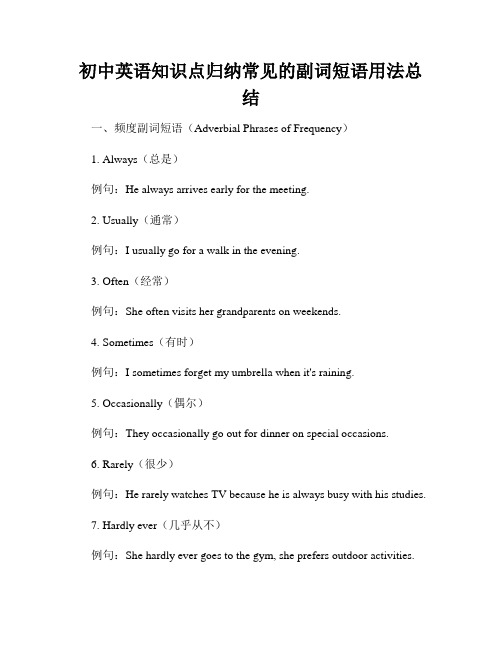
初中英语知识点归纳常见的副词短语用法总结一、频度副词短语(Adverbial Phrases of Frequency)1. Always(总是)例句:He always arrives early for the meeting.2. Usually(通常)例句:I usually go for a walk in the evening.3. Often(经常)例句:She often visits her grandparents on weekends.4. Sometimes(有时)例句:I sometimes forget my umbrella when it's raining.5. Occasionally(偶尔)例句:They occasionally go out for dinner on special occasions.6. Rarely(很少)例句:He rarely watches TV because he is always busy with his studies.7. Hardly ever(几乎从不)例句:She hardly ever goes to the gym, she prefers outdoor activities.8. Never(从不)例句:They never miss a chance to travel during summer vacation.二、时间副词短语(Adverbial Phrases of Time)1. In the morning/afternoon/evening(在早晨/下午/晚上)例句:I exercise in the morning before going to work.2. On weekdays/weekends(在工作日/周末)例句:I have to work on weekdays but I relax on weekends.3. At night(在晚上)例句:They like to stargaze at night in their backyard.4. By the end of(到...结束)例句:She will finish her project by the end of next week.5. In the meantime(与此同时)例句:While waiting for the bus, he read a book in the meantime.6. At the same time(同时)例句:They arrived at the party at the same time.7. From time to time(时常)例句:He visits his grandparents from time to time.8. All day/night long(整天/整晚)例句:They were dancing all night long at the party.三、地点副词短语(Adverbial Phrases of Place)1. In the park(在公园)例句:They often have picnics in the park on weekends.2. At school(在学校)例句:I met my friends at school during lunch break.3. On the beach(在海滩)例句:They love swimming and sunbathing on the beach.4. In the city/countryside(在城市/农村)例句:She enjoys the tranquility of living in the countryside.5. At home(在家)例句:He spends most of his weekends at home with his family. 6. On the way(在路上)例句:They had a great conversation on the way to the airport. 7. Across the road(在马路对面)例句:The supermarket is just across the road, it's very convenient.四、方式副词短语(Adverbial Phrases of Manner)1. In a hurry(匆忙地)例句:She left the house in a hurry because she was late for work.2. With pleasure(乐意地)例句:I will help you move next week, with pleasure.3. In a loud voice(大声地)例句:He shouted in a loud voice to get the attention of the audience.4. On purpose(故意地)例句:He spilled the drink on purpose to annoy his sister.5. By accident(偶然地)例句:I found this lost wallet by accident while walking in the park.6. In a funny way(滑稽地)例句:He imitates his teacher in a funny way and makes everyone laugh.7. In a serious manner(严肃地)例句:The teacher spoke to the students in a serious manner about their behavior.总结:副词短语在英语中起到修饰动词、形容词、副词和整个句子的作用,能够更准确地表达出时间、地点、方式和频率等信息。
初中英语知识点归纳副词的用法

初中英语知识点归纳副词的用法副词是英语中常见的词类,用于修饰动词、形容词、副词或整个句子。
它们可以提供关于动作、状态、程度、时间、地点等方面的信息。
本文将对初中英语中副词的用法进行归纳总结。
1. 副词修饰动词副词可以用来修饰动词,通常位于动词之前。
以下是常见的副词修饰动词的情况:- 表示方式:slowly(慢慢地)、quickly(快速地)、carefully(仔细地)等。
- 表示频率:always(总是)、often(经常)、sometimes(有时)、never(从不)等。
- 表示程度:very(非常)、quite(相当)、extremely(极其)等。
例如:- She speaks English fluently.(她流利地说英语。
)- They always go jogging together.(他们总是一起慢跑。
)- He is very funny.(他非常有趣。
)2. 副词修饰形容词副词也可以用来修饰形容词,一般位于形容词之前。
常见的副词修饰形容词的情况如下:- 表示程度:very(非常)、quite(相当)、extremely(极其)等。
例如:- She is very beautiful.(她非常漂亮。
)- The movie is extremely exciting.(这部电影非常令人激动。
)3. 副词修饰副词副词还可以用来修饰其他副词,一般位于被修饰的副词之前。
以下是常见的副词修饰副词的情况:- 表示方式:very(非常)、quite(相当)、somewhat(有点儿)等。
例如:- She speaks English very fluently.(她非常流利地说英语。
)- The car is quite fast.(这辆车相当快。
)4. 副词修饰整个句子副词也可以用来修饰整个句子,通常位于句子的开头或结尾。
以下是常见的副词修饰整个句子的情况:- 表示程度:seriously(认真地)、definitely(肯定地)、honestly (老实说)等。
英语语法副词归纳总结

英语语法副词归纳总结在英语语法中,副词是一类非常重要的词性,用于描述动词、形容词、其他副词或整个句子的性质、方式、时间、频率等。
本文将对常见的英语语法副词进行归纳总结,帮助读者更好地掌握和运用这些副词。
一、修饰动词的副词1. 副词修饰动词的方式:- 模糊副词:例如maybe(或许)、possibly(可能)、probably (大概)等,表示不确定或可能性较大。
- 频率副词:例如always(总是)、usually(通常)、often(经常)、sometimes(有时)、seldom(很少)、never(从不)等,表示动作或状态发生的频率。
- 程度副词:例如very(非常)、quite(相当)、too(太)、enough(足够)、extremely(极其)等,表示动作或状态的程度或强度。
- 方式副词:例如slowly(慢慢地)、carefully(小心地)、loudly(大声地)、happily(快乐地)等,表示动作发生的方式。
- 时间副词:例如now(现在)、then(然后)、today(今天)、yesterday(昨天)等,表示动作发生的时间。
2. 一些常见的修饰动词的副词:- go(去):already(已经)、soon(很快)、away(走开)、back(返回)等。
- do(做):well(好)、badly(糟糕地)、carefully(小心地)、fast(快速地)等。
- speak(说):loudly(大声地)、clearly(清楚地)、fluently(流利地)、softly(轻声地)等。
- eat(吃):slowly(慢慢地)、quickly(快速地)、heartily(饱餐一顿地)等。
- sleep(睡觉):well(好)、soundly(沉睡地)、peacefully(平静地)等。
二、修饰形容词的副词1. 副词修饰形容词的方式:- 程度副词:例如very(非常)、quite(相当)、extremely(极其)等,表示形容词的程度。
英语副词用法归纳大全

英语副词用法归纳大全嘿,同学们!咱们今天来好好聊聊英语里的副词那些事儿。
先来说说啥是副词哈。
副词啊,就像是给句子调味的小佐料,能让句子变得更有味道、更生动。
比如说,“He runs fast” 这里的“fast”就是个副词,它让我们知道他跑的速度咋样。
那副词都有啥类型呢?有表示时间的,像“yesterday”(昨天)、“now”(现在);有表示地点的,像“here”(这儿)、“there”(那儿);还有表示程度的,比如“very”(非常)、“quite”(相当)等等。
咱们先来讲讲表示时间的副词。
我记得有一次,我在公园里散步,突然听到有人喊:“Tomorrow is another day!” (明天又是新的一天!)这“tomorrow”就是个表示未来时间的副词。
还有像“I got up early this morning” 这里的“early”就是表示具体某个早上的时间状态。
再说说表示地点的副词。
有一次我去商场,听到广播里说:“Please come here quickly” (请快点到这儿来。
)这里的“here”就是告诉大家地点。
表示程度的副词也很有趣。
比如有个同学跟我说:“The movie is very interesting” 这里的“very”就强调了“有趣”的程度。
副词在句子中的位置也有讲究哦。
一般来说,它可以放在句首、句中或者句尾。
比如说,“Fortunately, I passed the exam” (幸运的是,我通过了考试。
)“fortunately”这个副词就放在了句首。
还有哦,副词可以用来修饰动词、形容词和其他副词。
像“She sings beautifully” (她唱得动听。
)“beautifully”就修饰了动词“sings”。
咱们在使用副词的时候,要注意别用错啦。
我就曾经看到过一个句子写成“She very likes apples” 这可就错啦,应该是“She likes apples very much”好啦,同学们,关于英语副词的用法,咱们今天就先说到这儿。
- 1、下载文档前请自行甄别文档内容的完整性,平台不提供额外的编辑、内容补充、找答案等附加服务。
- 2、"仅部分预览"的文档,不可在线预览部分如存在完整性等问题,可反馈申请退款(可完整预览的文档不适用该条件!)。
- 3、如文档侵犯您的权益,请联系客服反馈,我们会尽快为您处理(人工客服工作时间:9:00-18:30)。
【英语】副词的归纳一、单项选择副词1.If you are invited to any special occasion such as a wedding or a celebration, you will have to be ________ dressed.A.attractively B.controversiallyC.conventionally D.appropriately【答案】D【解析】【详解】考查副词辨析。
A. attractively吸引人地;B. controversially有争议地;C. conventionally传统地;D. appropriately合适地。
句意:如果你被邀请参加婚礼或庆典等特殊场合,你必须穿着得体。
故D选项正确。
2.She devoted herself ______ to her research and it earned her a good reputation in her field. A.strongly B.freely C.entirely D.extremely【答案】C【解析】考查副词辨析。
句意为:她将全部精力用于研究工作,这为她在这一领域赢得了良好的声誉。
entirely完全地,符合句意。
strongly强烈地;freely自由地;extremely极端地;极其;非常。
答案:C3.(杭州一检)She paused________over the unfamiliar word but soon continued. A.frequently B.brieflyC.anxiously D.casually【答案】B【解析】考查副词辨析。
句意为:她碰到不熟悉的词稍微停顿了一下,但很快又继续了。
frequently 频繁地;briefly短暂地,暂时地;anxiously焦急地;casually随意地,偶然地。
答案:B4.(山东实验中学二模)You can never be________careful,the road is icy and slippery. A.very B.tooC.quite D.rather【答案】B【解析】考查副词用法。
否定词not、never等与too连用时,意为“再……也不为过,越……越好”,其他几项均无此用法。
答案:B5.Parents often have high expectations for their children. ,it is Chinese parents who are trying their best to make their children nearly good at every subject.A.Personally B.BasicallyC.Hopefully D.Typically【答案】D【解析】句意:父母常常对他们的孩子寄予厚望。
尤为典型的是,中国的父母都在尽自己最大的努力来使他们的孩子几乎擅长每一门功课。
personally在个人看来;basically基本上;hopefully怀有希望地,有望;typically典型地,具有代表性地。
D项符合语境。
6.Mary became ______ homesick and critical of the United States, so she fled from her home in West Bloomfield to her hometown in Austria.A.completely B.sincerelyC.approximately D.increasingly【答案】D【解析】考查副词辨析。
句意:Mary日渐思乡,同时也对美国感到不满,于是她从她西布卢姆菲尔德的家回到了奥地利的家乡。
A. completely完全地,彻底地;B. sincerely真诚地;C. absolutely完全地,绝对地;D. increasingly日益增加地。
D项符合语境。
7.— Do you often come here to have a walk?— No, only _________, because we are much too busy.A.occasionally B.eventuallyC.merely D.frequently【答案】A【解析】【详解】考查副词。
上句:你经常来这里散步吗?下句:不,只是偶尔,因为我们太忙。
A.occasionally偶尔;B. eventually最后;C. merely仅仅;D. frequently频繁地。
故选A。
8.Michelle Obama told the audience not to “ let anyone ever tell you that this country isn’t great, that ____ we need to make it great again.”A.somehow B.somewhatC.somewhere D.otherwise【答案】A【解析】【详解】考查副词辨析。
A. somehow不知何故,设法;B. somewhat有点儿;C. somewhere某地;D. otherwise否则,要不然;句意:迈克尔奥巴马告诉听众不要让别人告诉你这个国家不再伟大了,我们要设法让这个国家再次伟大。
根据句意可知本句中的“somehow”意为“设法”,故A项正确。
9.–Do you think that the 16th Asian Games were a success?--Yes, _______!It couldn’t be better.A.relatively B.approximately C.absolutely D.fortunately【答案】C【解析】词义辨析。
Relatively相对的;approximately近似地,大约;absolutely绝对的;fortunately 幸运的。
你认为第16届亚运会成功吗、绝对的,没有比它更好的了。
选C。
10.“Qianshui”, which _________means diving water, refers to someone who only views the postings across the website but never makes any comments.A.deliberately B.accidentallyC.originally D.ridiculously【答案】C【解析】【详解】考查副词辨析。
句意:“Qianshui”原意是潜水,指只浏览网站上的帖子而不发表任何评论的人。
deliberately故意地;accidentally偶然地,意外地,非故意地;originally起初,独创地;ridiculously可笑地,荒谬地。
根据文章的语境可知,最初的意思,即原意,即是originally。
故选C 项。
11.She pretended to be calm but _____she was very nervous when she was being questioned. A.in actual B.as matter of factC.actually D.in a fact【答案】C【解析】【详解】考出副词辨析。
句意:当她被询问的时候她假装镇定,但实际上非常紧张。
AD两项搭配错误,B项意为“实际上”正确的形式为as a matter of fact,而副词actually意为“实际上”,暗含转折含义。
根据句意可知上下文是转折关系,故选C项。
12.It was beautiful house that we decided to buy it.A.so a B.such aC.a such D.a so【答案】B【解析】【详解】考查such与so用法的区别。
句意:它是如此美丽的房子,我们决定买下它。
such是形容词,用来修饰名词(名词前面可以带形容词,也可以不带)。
如果修饰单数可数名词,其后需加不定冠词a或an,so是副词,用来修饰形容词或副词,当单数可数名词前面有形容词修饰时,也可以用so,但要改变冠词的位置,故选B。
13.--- How could you have trusted the online dictionary that much in translating your resume? --- Well, I never expected it should translate it so ______.A.literally B.originally C.sufficiently D.professionally【答案】A【解析】【详解】考查副词。
句意:---你怎么能这么信任在线词典帮你翻译简历呢? ---我从没想过它会这么照字面翻译。
A. literally照字面地;B. originally最初;C. sufficiently充分地;D. professionally 专业地。
结合句意可知答案为A。
14.Publishers don't see e-books as a threat to written books. ______________, they see them as an opportunity to draw in a new generation of readers.A.Therefore. B.AnywayC.Instead D.Besides【答案】C【解析】【详解】考查副词词义辨析。
A. Therefore因此;B. Anyway无论如何;C. Instead相反;D. Besides此外。
句意:出版商并不认为电子书会对书面书籍构成威胁,相反,他们认为这是一个吸引新一代读者的机会。
根据句意可知此处表示“相反、反而”,故C项正确。
15.There is someone playing the guitar over there. Let's go and listen, shall we? Free entertainment, ________.A.anyway B.thoughC.therefore D.somehow【答案】A【解析】【详解】考查副词词义辨析。
句意:那边有人在弹吉他。
我们去听听,好吗?不管怎么说,这是免费的娱乐。
A. anyway不管怎么说;B. though尽管;C. therefore因此;D. somehow以某种方式。
anyway“不管怎么说”符合句意。
